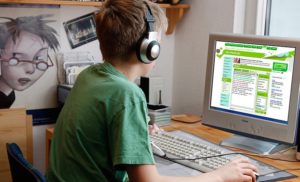Content
Millions of users of the World Wide Web are also active participants in various social networks. Distance is not an obstacle to virtual contact. The speed of information exchange, advertising and product promotion are useful properties of social networks. Unfortunately, cases when negative information is disseminated through services have become more frequent. The benefits and harms of social networks are a dilemma, the solution of which is available only to the user himself. A few tips will save an unprepared person from possible troubles on the Internet.
The benefits of social media
The rave reviews about the appearance of the first social networks on the Internet come to mind. New opportunities opened up for finding old friends, communication for obtaining useful information, interesting data. For the modern user, social networks are everyday life. The properties of mobile applications have made this type of communication available to anyone who has a smartphone.

Find friends and work
The benefits of social media are undeniable. The simple registration procedure on the social network opens up a wide range of options for the visitor.
- The first useful property is finding old friends. An opportunity presented itself to restore long-lost connections, to find classmates who had dispersed all over the world. Learn about their lives, see photos, resume correspondence.
- Everyday relationships have been simplified. There is no longer the need to meet to exchange news, remember dates of birth, important events. A few clicks on the keyboard - and friends are in the know, and the system reminds of an important date.
- Finding like-minded people and friends with the same interests is another useful property of social networks. It is enough to fill in the data about hobbies, music, games, and the system itself will suggest groups suitable for hobbies.
- Social networks provide an opportunity to earn money. Ads, links, testimonials and advice help users to promote their services and become useful when looking for work.
Broadening your horizons
The availability of almost any useful data allows for self-education. There is no need to attend special courses. The exchange of useful advice and personal experience takes place online. Registration on educational portals provides access to the acquisition of knowledge that is not available within the framework of the general education school program. Participation in online contests, olympiads at various levels evaluates the knowledge gained, stimulates the expansion of horizons.

The main benefit of social networks is the prompt dissemination and search of the necessary information.
The harm of social networks
Social networks have not only a positive effect on a person, but also do harm. In our age of super speeds, people are faced with a constant shortage of time: it is sorely lacking. One of the reasons for the lack of time was spending time on social networks. Surely everyone noticed that, sitting down only to watch the news or check the mail, the process drags on for an hour or more. Waste of time is the first negative property of social media.
Social media addiction
Many people think that there is no dependence, everything is under control, and virtual communication does no harm. Social media has a significant impact on the psyche. For harmonious development, a person needs constant recognition as a person. Before the advent of social networks, you had to constantly work on yourself, to prove your worth. With their appearance, everything has become easier. It is enough to post a photo or video and you can collect likes.

Having received approval on social networks, the user experiences a kind of euphoria. Once, twice, and now - addiction: the first thing the morning starts with is viewing your account. During the day, free time appeared - and they go to their page.
Fatigue and stress
The properties of social networks have a negative impact when a person uses them non-stop. The flow of news, the change of emotions, impressions, the solution of multilevel tasks - all this leads to fatigue and is harmful to health. Radiation from the monitor has a detrimental effect on the retina.
Many people do not understand that most of the visitors to social networks embellish their reality. Perceiving the virtual image for reality, an inferiority complex is created. It seems that an old acquaintance is handsome, rich and successful. This perception hurts self-esteem, harms the psyche. As a result, the body gets stress, the person falls into depression.
Decreased intelligence
People want to use easy ways to have fun. Contact in social networks comes down to putting down likes, correspondence is full of emoticons and abbreviations. Instead of "good afternoon" they write "hello". Telling your mood comes down to inserting an emoticon. It comes to the point of absurdity: under the status of "blessed memory of those killed in the crash" they click "like". This method of communication becomes a habit, becomes the norm and is applied in everyday life. There is little benefit from this, it is difficult for active visitors to social networks to rebuild their relationships to generally accepted forms. This becomes an obstacle to a full-fledged dialogue, since people who are far from computer slang have difficulty understanding such a story.
Decreased concentration of attention
Constant use of social networks develops the habit of receiving information in batches in the brain. Several processes are going on simultaneously: listening to music, viewing photos, writing comments, reading news. As a result, there is a decrease in concentration of attention. Harm to the body.
The term hyperactivity, known in psychology, accurately defines the state of a person. He cannot concentrate on completing one task; long-term occupation tires him. Useful material is not assimilated. Working capacity decreases, labor productivity decreases. Therefore, many employers block access to social networks for their employees, seeing the harm caused by virtual communication.
Information trash
Submission of information on the Internet occurs in such a way that, with the intention of viewing the weather forecast, the user is forced to close pop-up windows with advertisements, news blocks, links to various sites. Many do not cope with this task. All this attracts attention, leads away from the main goal. A person receives a stream of unnecessary, sometimes unnecessary information. If you do not control this process and block excess, the brain is overloaded, fatigue, irritation accumulates, and the body is harmed.

Virtual communication replaces real
By texting on the vastness of social networks, people lose their real communication skills. Psychologists describe cases when a wife asks her husband to put the kettle on to warm up, having written to him about this on Vkontakte.
Instead of congratulating the veteran on the Victory Day, giving flowers, listening to memories, helping in something, it all comes down to adding a St. George ribbon to your avatar. Real help to the victims is replaced by the addition of a "memory candle", considering that in this way an introduction to the common cause took place.
People stopped dating. It is much easier, lying on the couch, to throw off videos to each other, and discuss the viewing by putting a smiley. In social networks, words and feelings that are transmitted through personal contact lose their meaning. It is easy to hide feelings here or to falsify emotions. It doesn't matter what gender a person is, how old he is, what he looks like, what he does.
Teens and the social network
The benefits and harms of social networks for teens are equally dependent on the quality of the content that children use, as well as the time spent on the World Wide Web. Educational social networks are gaining popularity. They are usefully used to exchange data between school, student and parent. Unfortunately, not all Internet sites are aimed at increasing the level of user knowledge, some harm instead of benefit.
Social media advocates believe virtual communication has beneficial properties, helping today's children not feel lonely. But only when it does not replace the real. The dependence of adolescents on social networks is the stronger, the less control over this process is exercised by parents. If not controlled, then the son or daughter is involved in virtual games, becomes dependent on the assessment of the environment. Its absence introduces them into a state of depression or pushes them to search for such groups where any action is regarded as an achievement or a feat.

A teenager who is addicted to social media misjudges people. He doesn't feel responsible. A child can imagine himself to be anyone, is capable of offending an opponent, causing harm, without feeling any remorse or empathy.
Friends are easily added on social networks, even strangers, it is even easier to part with them: by one click, deleting or sending to the black list. The behavior of a teenager changes under the influence of the group. According to the law of the crowd, personal responsibility for the committed action is removed, so as not to become an outcast, the teenager chooses the path of the majority.
To raise their rating, it has become a frequent occurrence for the public to post videos of cruelty to their peers or animals. To get the coveted likes from the group members, the teenager goes to the crime in relation to the weaker one.
When children and social media are combined, cyberbullying is a danger when a child is bullied through social media. Not all schoolchildren talk about this, so the task of adults is to protect them from such exposure. Unauthorized links, adding strangers as friends, or visiting questionable sites are equally harmful.
The negative impact of social networks on adolescent health and behavior occurs when control over children is weakened. It is impossible to completely prohibit communication on social networks, but it is imperative to stipulate the conditions on which their use of gadgets will be carried out. The task of the adult is to make this communication safe for physical and mental health. This is achieved by technical support such as "parental control", installation of antiviruses and restriction of the child's presence on the Internet. Visiting various circles and sections, as well as the personal example of an adult, confirmed by live communication, will help to avoid dependence on social networks. The benefits of such a pastime will be mutual.
Conclusion
The benefits and harms of social media are like two sides of the same coin. It is within the power of everyone to take useful properties from virtual relationships and prevent harm from entering their reality.

